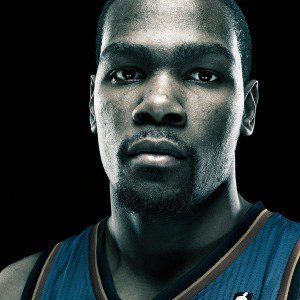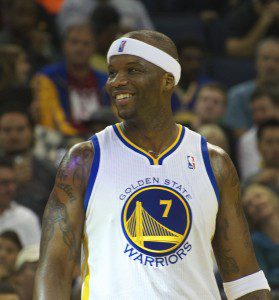 The most recent issue of the New York Times magazine features an engrossing profile of Kevin Durant and the Oklahoma City Thunder by Sam Anderson. It touches on an issue that I mull over sometimes: the effect of celebrity on a person. Here’s a swatch from the long-form profile that illuminates the incredible pressures of massive fame:
The most recent issue of the New York Times magazine features an engrossing profile of Kevin Durant and the Oklahoma City Thunder by Sam Anderson. It touches on an issue that I mull over sometimes: the effect of celebrity on a person. Here’s a swatch from the long-form profile that illuminates the incredible pressures of massive fame:
One evening I went to the mall to observe one of Durant’s public events. He was at a GameStop, signing copies of a new video game that featured him on its cover. I arrived to find the OKC equivalent of Beatlemania: a line of people, decked out in Thunder gear, stretching out the door and wrapping around the neighboring stores. As I approached the scene, a policeman was dragging a young man who apparently tried to get too close down an escalator. Just then a huge cheer broke out from the crowd. Durant had arrived, through a back entrance, along with a small entourage. I squeezed past the line, stood at the side of the room and watched him throughout the session.
He was wearing his signature “KD” gear: hat, T-shirt, sweats. He seemed friendly but also not totally present. Between signatures and photos, he would occasionally grab his phone and sneak a text message under the table. He bantered, here and there, with a couple of kids, but mostly he was quiet and dutiful. His smile seemed automatic. I got the sense that Kevin Durant, the actual 24-year-old guy with the secret tattoos, was hardly even there that night: he was just an avatar for his own fame — this abstract thing that doesn’t actually exist but is millions of times bigger than he is. Not that that was his fault, of course. Even if Durant wanted to genuinely connect with people that night, the sheer scale made it impossible. There was too much inflow for a single person’s outflow. I got a sense of how insane it must be to live that kind of life, in which things are like that every day, everywhere. Is it even possible to be a good, thoughtful, civic-minded person under that kind of pressure? Suddenly all of those sociopathic scoring champions made sense to me. Radical detachment seemed, in a strange and sad way, almost like the proper response.
It’s interesting to think of this kind of pressure in light of Jesus separating himself from the crowds to pray (Matthew 14:22). In order to minister, one must separate oneself from the flow of life. This is made harder in a digital age. It is also even more essential. Many of us can scarcely imagine what Durant and other celebrities experience, but we all know the necessity of time alone with God.
How frightening–and overwhelming–it must be to face this kind of life without Christ. I hope that Durant’s professed faith holds fast in the face of constant pressure, and what must be staggering temptation. To face temptation without the normal limits ordinary life imposes would be a fearsome thing.
(Image: Howard Schatz/NYT)











